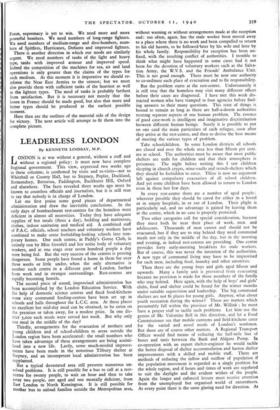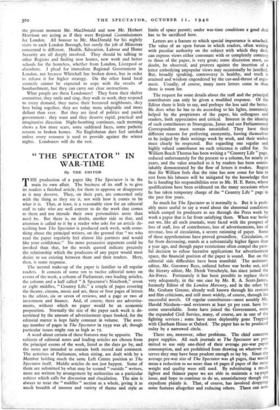LEADERLESS LONDON
By KENNETH LINDSAY, M.P.
LONDON is at war without a general, without a staff and without a regional policy: it must now have complete Regional government. This view, expressed two weeks ago in these columns, is confirmed by visits and re-visits—not to Whitehall or County Hall, but to Stepney, Poplar, Dockland, Bermondsey, Battersea, Paddington, Buckhurst Hill, Oxford and elsewhere. The facts revealed three weeks ago must be known to countless officials and journalists, but it is still true to say that nobody is in charge of London.
Let me first praise some good pieces of departmental administration and draw the inevitable conclusions. In the early days of bombardment rest-centres for the homeless were deficient in almost all necessities. Today they have adequate supplies of hot meals (three a day), bedding and mattresses, clothes, indoor sanitation and medical aid. A combined staff of P.A.C. officials, school teachers and voluntary workers have combined to make some forbidding-looking schools into tem- porary homes. One such centre, at Paddy's Goose Club, is entirely run by Miss Grenfell and her noble body of voluntary workers, and at one stage over seven hundred people a day were being fed. But the very success of the centres is proving dangerous. Some people have found a home in them for over three weeks or little under, when the only alternative is another such centre in a different part of London, further from work and in stranger surroundings. Rest-centres are rapidly becoming hostels.
The second piece of sound, improvised administration has been accomplished by the London Education Service. With the help of domestic science centres and fixed food-kitchens some sixty communal feeding-centres have been set up in schools and halls throughout the L.C.C. area. At these places an excellent hot mid-day meal can be obtained, to be eaten on the premises or taken away, for a modest price. In one dis- trict 5,000 such meals were served last week. But why only one meal in the middle of the day?
Thirdly, arrangements for the evacuation of mothers and young children and of school-children to areas outside the London region have been accelerated: the small numbers who have taken advantage of these arrangements are being assimi- lated into a new life. Lastly, some much-needed improve- ments have been made in the notorious Tilbury shelter at Stepney, and an incompetent local administration has been supplanted.
But a typical devastated area still presents numerous un- solved problems. It is still possible for a bus to call at a rest- centre for twenty people, to wait an hour and then to take away two people, one aged and one mentally deficient, rrom East London to North Kensington. It is still possible for another bus to unload families outside the Metropolitan area, without warning or without arrangements made at the reception end: too often, again, has the male worker been moved away to a place where there is no work and been compelled to return to his old haunts, to be followed-later by his wife and later by his whole family. Responsibility for reception has been un- fixed, with the resulting conflict of authorities. I tremble to think what might have happened in some cases had it not been for the devotion of voluntary workers such as the Salva- tion Army, the W.V.S. and the Friends' Ambulance Unit.
This is not good enough. There must be now one authority to co-ordinate each place of evacuation and to fix responsibility. But the problem starts at the rest-centre. Unfortunately it is still true that the homeless may visit many different offices before their cases are diagnosed. I have met this week dis- tracted women who have tramped to four agencies before find- ing answers to their many questions. This state of things is bound to remain as long as there are half-a-dozen authorities treating separate aspects of one human problem. TN. essence of good case-work is intelligent and imaginative discrimination between different human beings. Surely it is possible to put on one card the main particulars of each refugee, soon after they arrive at the rest-centre, and then to devise the best means of meeting the various types of problem.
Take schoolchildren. In some London districts all schools are closed and over the whole area less than fifteen per cent. are at school. The authorities must be aware that most public shelters are unfit for children and that their atmosphere is poisonous. The night before writing this I saw children sleeping in church crypts, wine-vaults and trench-shelters which they should be forbidden to enter. There is now no argument left against compulsory evacuation of all school children. And yet some children have been allowed to icturn to London even in these last few days.
In every rest-centre there are a number of aged people: wherever possible they should be cared for either in a hostel or in empty hospitals, in or out of London. Their plight is particularly sad, and no advantage is gained by leaving them at the centre, which in no case is properly protected.
Two other categories call for special consideration, because they must both be near their place of work, men and adolescents. Thousands of men cannot and should not be evacuated, but if they are to stay behind they need communal meals not only in the middle of the day, but in the morning and evening, as indeed rest-centres are providing. One centre provides forty early-morning breakfasts for male workers. But of course, this was never the intention of the authorities. A new type of communal living may have to be improvised for such men, including food, laundry and other amenities.
Then there are the young boys and girls aged fifteen and upwards. Many a family unit is prevented from evacuating because no provision is made for those members of the family who stay behind. Here again, with the help of boys' and girls' clubs, food and shelter could be found for the winter months under suitable supervision and leadership. The big communal shelters are not fit places for young girls. Anyway, what about youth recreation during the winter? These are matters which presumably fall within the province of Mr. Willink ; he must have a proper staff to tackle such problems. Let him use the genius of Mr. Valentine Bell in this direction, and let a Food Commissioner see that mobile canteens and field-kitchens cater for the varied and novel needs of London's workmen. But there are of course other matters. A Regional Transport Officer would find means of reducing the half-mile line of buses and taxis between the Bank and Aldgate Pump. In co-operation with an expert shelter-engineer he would tackle the better disposal of shelter accommodation and hasten shelter improvements with a skilled and mobile staff. There are methods of reducing the inflow and outflow of population if the population movement is regarded as a single problem for the whole region, and if hours and times of work are regulated to suit the daylight and the evident wishes of the people. Again the longer and enforced leisure must receive attention from the unemployed but organised world of entertainers. At every point there is the same glaring need for direction. At the present moment Mr. MacDonald and now Mr. Herbert Morrison are acting as if they were Regional Commissioners for London. All honour to Mr. MacDonald for his nightly visits to each London Borough, but surely the job of Ministers concerned is different. Health, Education, Labour and Home Security are all deeply involved. They should be talking to other Regions and finding new homes, new work and better schools for the homeless, whether from London, Liverpool or elsewhere. I plead for immediate Regional Government in London, not because Whitehall has broken down, but in order to release it for higher strategy. On the other hand local councils cannot be expected to cope with the results of bombardment, but they can carry out clear instructions.
What people are these Londoners! They form their shelter committee, they smile and sing, they walk to work, they respond to every demand, they nurse their bereaved neighbours, they love being together, they are today more adaptable and more defiant than ever. But they are tired of politics and parish government: they want and they deserve rapid, practical and imaginative direction. Night-bombing continues, each morning shows a few more scars, some saddened faces, some pathetic returns to broken homes. No Englishman dare feel satisfied unless every resource is used to provide against the winter nights. Londoners will do the rest.



























 Previous page
Previous page